17 Vegetables Highest in Water
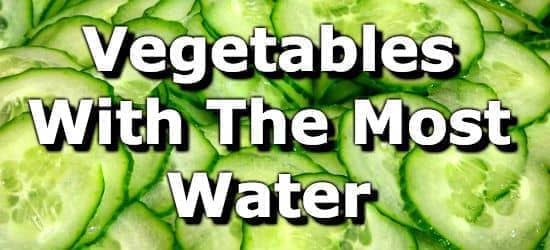
Water is an essential nutrient required to maintain homeostasis in our bodies. (1)
A deficiency in water, called dehydration, leads to headaches, loss of appetite, confusion, unexplained tiredness, and even seizures. (2) Excessive dehydration can even lead to death.
Conversely consuming too much water can lead to disorientation, confusion, nausea, vomiting, and in extreme cases, death. (3)
The U.S. Reference Dietary Intake (RDI) for water is 3.7 liters (130oz) per day for men and 2.7 liters (95oz) for women. (4) Though people who are active and under the sun should consume more.
Of all foods, vegetables provide the most water, often being over 90% water by weight. Vegetables high in water include lettuce, celery, bok choy, radish, cucumber, zucchini, watercress, tomatoes, green bell peppers, and asparagus.
In addition to the 17 vegetables listed below, you can view the nutrient ranking of over 200 vegetables high in water.
-
Up to 96% water
 1. Lettuce
1. Lettuce
Water per Cup Shredded Water per 100g 26.8ml (0.9oz) 95.6ml (3.4oz) -
Up to 95% water
 2. Celery
2. Celery
Water per Cup Raw Water per 100g 96.4ml (3.4oz) 95.4ml (3.4oz) -
Up to 95% water
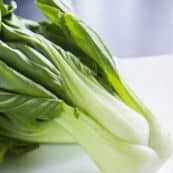 3. Bok Choy (Pak Choi)
3. Bok Choy (Pak Choi)
Water per Cup Raw Water per 100g 66.7ml (2.4oz) 95.3ml (3.4oz) -
Up to 95% water
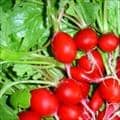 4. Radishes
4. Radishes
Water per Cup Sliced Water per 100g 110.5ml (3.9oz) 95.3ml (3.4oz) -
Up to 95% water
 5. Cucumber
5. Cucumber
Water per Cup Water per 100g 99ml (3.5oz) 95.2ml (3.4oz) -
Up to 95% water
 6. Zucchini
6. Zucchini
Water per Cup Cooked Water per 100g 171.4ml (6oz) 95.2ml (3.4oz) -
Up to 95% water
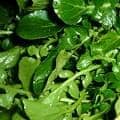 7. Watercress
7. Watercress
Water per Cup Water per 100g 32.3ml (1.1oz) 95.1ml (3.4oz) -
Up to 95% water
8. Tomatoes
Water per Cup Cooked Water per 100g 170.1ml (6oz) 94.5ml (3.3oz) -
Up to 94% water
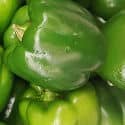 9. Green Bell Peppers
9. Green Bell Peppers
Water per Cup Water per 100g 86.4ml (3oz) 93.9ml (3.3oz) -
Up to 93% water
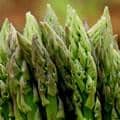 10. Asparagus
10. Asparagus
Water per Cup Water per 100g 124.9ml (4.4oz) 93.2ml (3.3oz) -
Up to 93% water
 11. Portabella Mushrooms
11. Portabella Mushrooms
Water per Cup Water per 100g 79.8ml (2.8oz) 92.8ml (3.3oz) -
Up to 93% water
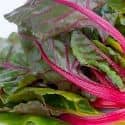 12. Swiss Chard
12. Swiss Chard
Water per Cup Raw Water per 100g 33.4ml (1.2oz) 92.7ml (3.3oz) -
Up to 93% water
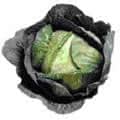 13. Cabbage
13. Cabbage
Water per Cup Cooked Water per 100g 138.9ml (4.9oz) 92.6ml (3.3oz) -
Up to 93% water
 14. Okra
14. Okra
Water per Cup Cooked Water per 100g 148.1ml (5.2oz) 92.6ml (3.3oz) -
Up to 92% water
 15. Cauliflower
15. Cauliflower
Water per Cup Water per 100g 98.5ml (3.5oz) 92.1ml (3.2oz) -
Up to 91% water
 16. Spinach
16. Spinach
Water per Cup (Fresh) Water per 100g 27.4ml (1oz) 91.4ml (3.2oz) -
Up to 89% water
 17. Broccoli
17. Broccoli
Water per Cup Water per 100g 81.3ml (2.9oz) 89.3ml (3.1oz)
From the Nutrient Ranking Tool
Use the ranking tool links below to select foods and create your own food list to share or print.
- Foods High in Water
- Foods Low in Water
- Vegetables High in Water
- Fruits High in Water
- Vegetarian Foods High in Water
- Nuts High in Water
- Grains High in Water
- Beans High in Water
- Dairy High in Water
- Breakfast Cereals High in Water
- Fast Foods High in Water
View more nutrients with the nutrient ranking tool, or see ratios with the nutrient ratio tool.
Related
Data Sources and References
- Armstrong LE, Ganio MS, Klau JF, Johnson EC, Casa DJ, Maresh CM. Biobehavioral variation in human water needs: How adaptations, early life environments, and the life course affect body water homeostasis Appl Physiol Nutr Metab. 2014 Feb;39(2):138-44. doi: 10.1139/apnm-2012-0369. Epub 2013 Jul 29. 24476468
- National Library of Medicine - Adult Dehydration by Kory Taylor and Elizabeth B. Jones.
- National Library of Medicine - Water Toxicity Basil V. Peechakara and Mohit Gupta.
- Institute of Medicine Reference Intakes for Water
Try the recipe nutrition calculator, or daily meal planner.
Create a free account to log and track foods.

 Next ➞
Next ➞